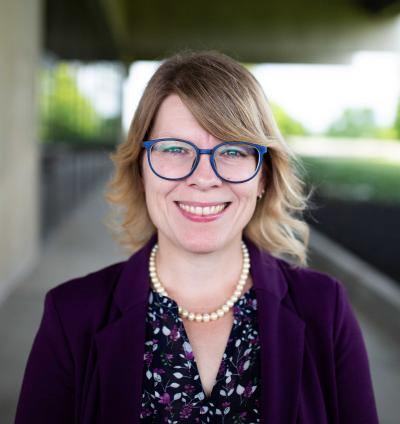Andrea Brookover

Andrea (Rice) Brookover, BA 2002, is Executive Director of the Ohio Holocaust and Genocide Memorial and Education Commission.
How did you become interested in history as an academic discipline? What made you want to major in History?
I cannot remember a time in my life when I wasn’t consumed by a love of history. As a young child, I would dress up and pretend to be historical characters in my childhood playroom with my siblings. Family visits to the Cleveland Museums of Art and Natural History and an elementary field trip to The Henry Ford and Greenfield Village instilled an intense passion for public history, in particular. I was fascinated by papers and objects that had literally been in the hands of previous generations, and I learned everything I could about careers that would give me the opportunity to research and handle primary documents and artifacts. By the time I entered high school, my mind was already set on majoring in history. I never considered any other option.
Tell us about your experience taking courses in the Ohio State Department of History. Do you have any particularly vivid memories from your time as an undergraduate?
While attending OSU-Mansfield in my second year as an undergraduate, I had the great privilege of taking a History of the Holocaust course from Dr. Raymond Dominick. The course had a profound impact on me, leading me to further study the history of modern Germany with Dr. Dominick and later World War II history with Dr. Allan Millett on main campus. The study of the war and of the Holocaust set me on a career track that I would have never imagined possible, leading to an amazing position as a graduate student at Wright State University cataloging Holocaust education materials and culminating with a position as the first director of the Ohio Holocaust and Genocide Memorial and Education Commission.
How did your experience as a history major help prepare you for the future, both professionally and personally?
History offers students the insights of perspective. From historic figures to the scholars who research and teach the histories of those figures, each has their own individual, unique perspectives in life. Recognizing and acknowledging differing perspectives is crucial to developing both critical thinking and relationship building, which are equally important life skills to foster as you navigate careers and personal life.
What advice would you give to current or prospective history majors who are interested in careers in public history?
Take advantage of every opportunity to acquire practical experience in the field wherever possible. Apply for internships and volunteer with organizations that align with your career interests and goals to gain the knowledge needed to decide where you want to start a career. Think outside of the box and look for opportunities to learn new skills, particularly public-facing roles, as interpersonal skills are so important in this field.
